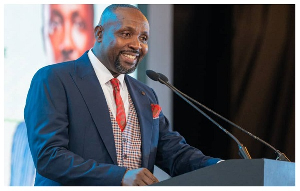A section of the public have given great credence to Martin A. B. K. Amidu’s appointment as Special Prosecutor to investigate and prosecute corrupt public persons who have been exposed in the performances of their duties not excluding corrupt officials in the private sector.
Being one of President Nana Akufo-Addo’s key campaign promises, the office of the Special Prosecutor has the responsibility of dealing with corruption under the authority of the Attorney-General.
Mr. Amidu, a former Attorney General under the National Democratic Congress (NDC) administration, was named Special Prosecutor today at the Flagstaff House by President Akufo-Addo after an emergency cabinet meeting.
This has been met with mixed feeling from the public as some are baffled at the President’s decision, wondering why a member of the opposition could be trusted with such a key position.
Others believe Mr. Amidu proved himself a just and objective man when he stood up against some members of his party for their wrongs, saying he is more than capable to manage the office of the Special Prosecutor, believing his services will drastically address the issue of corruption in the country.
The appointment follows the Presidents’ approval of the office of the Special Prosecutor Bill, 2017, which had incited a rigorous debate in the country as to whether it was necessary.
Mr. Amidu’s appointment is to make every Ghanaian see the office of the Special Prosecutor as unbiased.
According to the Office of the Special Prosecutors Bill, 2017, the Office is also responsible for;
• Investigating and prosecuting cases of alleged corruption and corruption related offences under the Public Procurement Act, 2003 (Act 663) and investigate allegations of corruption and corruption related offences under the Criminal and Other Offences Act, 1960 (Act 29) implicating public officers and politically exposed persons.
• Prosecuting of corruption-related offences involving public officers and politically exposed persons on the authority of the Attorney-General.
• Recovering of the proceeds of corruption and corruption-related offences and co-operation and coordination with competent authorities and other relevant local and international agencies in the performance of its functions.
Click to view details



General News of Thursday, 11 January 2018
Source: www.ghanaweb.com

















